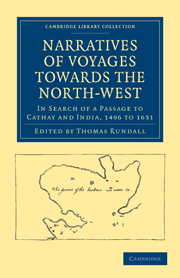 Narratives of Voyages Towards the North-West, in Search of a Passage to Cathay and India, 1496 to 1631
Narratives of Voyages Towards the North-West, in Search of a Passage to Cathay and India, 1496 to 1631 A period of about three centuries and a half has elapsed since the project of seeking a passage to the eastern hemisphere, by way of the North-west, was first entertained. Henry VII, then reigning in England, earnestly desired to promote maritime enterprise on the part of his subjects; and, under the influence of that feeling, had sought, but failed, to secure the services of Christoval Colon, whose fame, as Christopher Columbus, is universal, and will endure for all time. After the failure of the overture made to Columbus, a Venetian, by name John Cabota, accompanied by his three sons, Lewis, Sebastian, and Sancius, visited this realm; and the high reputation enjoyed by the father, for skill in navigation, and intrepidity as a seaman, caused him to be deemed a welcome visitor, and gained for him a cordial reception. This talented foreigner may be considered to have introduced a new era in the annals of English navigation, and to have originated the idea of an enterprise invested with no ordinary interest: in the prosecution of which, the energies of men of no ordinary character have been enlisted; and for the accomplishment of which, anxiety of no ordinary description is experienced.
Further than this, the accounts of John Cabota are vague and discrepant. He is represented to have made one attempt, or more than one attempt, to explore the North-polar seas; but the record of his proceedings is imperfect; and nothing authentic can be collected, except the simple fact of his having been engaged in the enterprise. Such being the case, the voyage undertaken by his son Sebastian, who proved himself worthy of the name he inherited; will be brought under notice.
To save this book to your Kindle, first ensure [email protected] is added to your Approved Personal Document E-mail List under your Personal Document Settings on the Manage Your Content and Devices page of your Amazon account. Then enter the ‘name’ part of your Kindle email address below. Find out more about saving to your Kindle.
Note you can select to save to either the @free.kindle.com or @kindle.com variations. ‘@free.kindle.com’ emails are free but can only be saved to your device when it is connected to wi-fi. ‘@kindle.com’ emails can be delivered even when you are not connected to wi-fi, but note that service fees apply.
Find out more about the Kindle Personal Document Service.
To save content items to your account, please confirm that you agree to abide by our usage policies. If this is the first time you use this feature, you will be asked to authorise Cambridge Core to connect with your account. Find out more about saving content to Dropbox.
To save content items to your account, please confirm that you agree to abide by our usage policies. If this is the first time you use this feature, you will be asked to authorise Cambridge Core to connect with your account. Find out more about saving content to Google Drive.